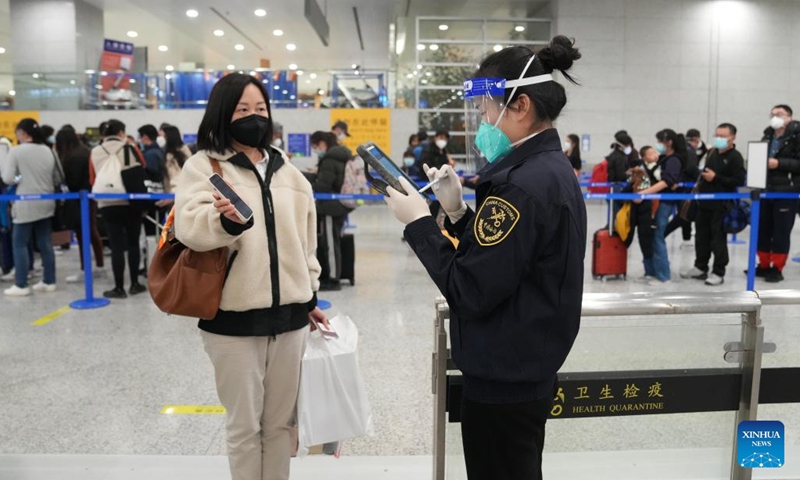Chinese embassies require travelers entering China to provide negative 48-hour nucleic acid results

A staff member of the customs of Shanghai Pudong International Airport checks the information of an inbound passenger in east China's Shanghai, Jan. 8, 2023. From Sunday, China starts managing COVID-19 with measures designed for combating Class B infectious diseases, instead of Class A infectious diseases. (Xinhua/Ding Ting)
Chinese embassies in US, Russia, Brazil, Singapore, Canada, Japan and South Korea said in statement that the requirement is in response to the interim measures for travel between China and other countries after the optimization of COVID management released by the Chinese government on December 27, 2022.
From January 8, 2023, China reopened its borders after the government downgraded the management level of COVID-19 from Class A to Class B, and meanwhile reopened its borders after three years of the pandemic.
In the statement, the embassies also said that passengers entering China from Japan and South Korea should complete the necessary customs clearance procedures after arriving at the port with the health declaration code. Those who have a normal health declaration and no abnormalities in the routine hygienic inspection at the port can enter the country.
However, people with abnormal health declarations or symptoms such as fever will be tested by the customs for nucleic acid. Those who test positive should be quarantined or seek medical treatment in accordance with the requirements of the notice.
Passengers have also been reminded to strictly observe all epidemic prevention and control regulations, including wearing masks and taking good personal protection, on board and upon arrival in China, read the statement.
China earlier suspended issuing short-term visas for South Korean and Japanese citizens seeking to enter China for visit, business, tourism, medical treatment, transit or other personal affairs, with the new adjustment taking effect starting January 10, Chinese embassies in South Korea and Japan said in the statements.
The decision will be reassessed once the two countries remove their discriminatory travel restrictions targeting travelers from China, the statement said.
The US, Japan and South Korea are among the countries that announced restrictions on travelers from China, citing concerns that the current surge of COVID-19 cases in China could lead to the emergence of new variants.
China again calls on countries to base their COVID response measures on science and not to resort to political manipulation or discriminatory measures, Chinese Foreign Ministry Spokesperson Wang Wenbin said on January 10 commenting on whether the country will take countermeasures against other countries after China suspended the issuing of short-term visas to South Korean citizens.
China takes reciprocal countermeasures and urges relevant countries to take appropriate measures based on science and facts and to stop political manipulation and discriminatory measures, in order not to affect normal people-to-people exchanges, said Wang.
Global Times
